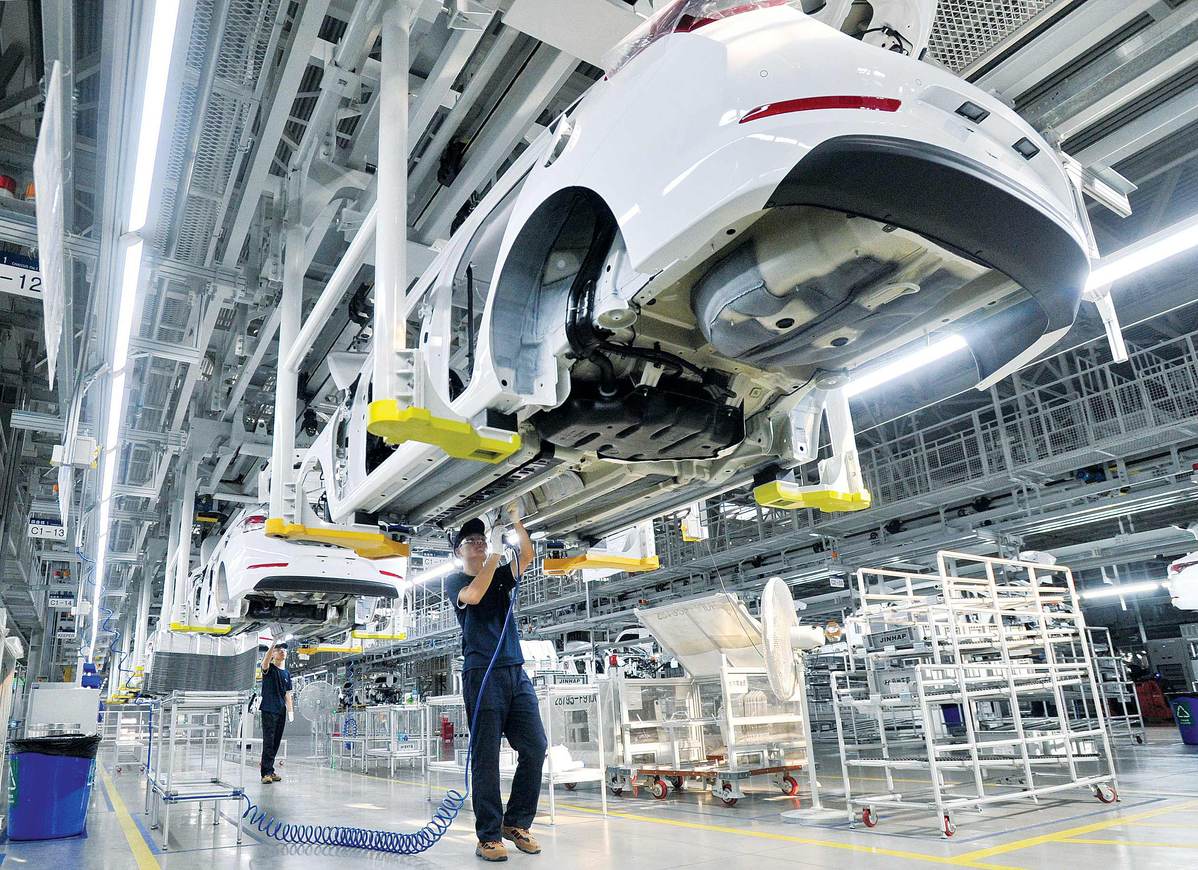Quality Time


Overall development of the economy, rather than just quantity of growth, is given priority at this year's two sessions political gathering in Beijing
The quality rather than just the quantity of China's economic growth is high on the agenda as China's top officials descend on Beijing for the major political gathering of the year, according to experts.
One of the main focuses of the annual two sessions is usually the GDP growth target, which is set in the Government Work Report delivered by Premier Li Keqiang on March 5.
Yet, with achieving high-quality growth now a government priority, equal attention is given this year to how China intends to tackle industrial overcapacity, excess debt and income inequality, as well as environmental degradation, while pursuing development.
Zhu Ning, Oceanwide professor of finance at Tsinghua University, says the importance attached to a new and more inclusive growth strategy was made clear at the Central Economic Work Conference, a key meeting in Beijing in December.
"The focus now is on the development of the overall economy. People have criticized China's growth about being all about growth's sake and not about development. We want a broader-based, more inclusive development than just the growth of the number," he says.
Zhu, an acknowledged expert on China's financial system, says he is glad that priority has been given to measures to reduce poverty, deal with the environment and tackle China's debt problem.
"We have already seen a crackdown on environmentally polluting companies over the past few months. The government also lifted 10 million people out of poverty in a single year last year. There have also been other measures to get rid of the implicit guarantees in wealth management products, which will lead to more financial responsibility."
Douglas McWilliams, deputy chairman of the Centre for Economics and Business Research, the London-based economics consultancy, says China's adjustment to a higher-quality growth model could happen automatically, rather than be forced by policy changes.
"Labor shortages are leading to higher wages and higher productivity, which will bring about the change on its own. Growth, however, needs to be more evenly spread regionally. Western China, in particular, needs to catch up. The savings ratio also needs to fall, and working hours need to adjust to give a better work/life balance," he says.
Edward Tse, managing director of Gao Feng Advisory and an expert on China's tech industry sector, believes China's new industry sectors are already generating high-quality growth.
"Internet-based businesses ranging from e-commerce to car-hailing services have been growing twice as quickly as China's overall economy for the past 10 years. I expect the contribution from the new economy to continue in 2018, along with an increase in consumption and investment as well as trade."
With China expecting to contribute 35 percent of global growth this year, according to the International Monetary Fund, financial markets across the world will also pay close attention to the government's growth target.
Last year, the figure was set at "around 6.5 percent, or higher if possible" and was comfortably achieved with GDP rising 6.9 percent in 2017 — the first time annual growth has accelerated since 2010.
This year, the growth target was still set at around 6.5 percent. China still needs to grow at a relatively fast pace to meet the government's aim of becoming a "moderately well off society" by 2020, in time for the following year's 100th anniversary of the founding of the Communist Party of China. To achieve this, it needs to double the 2010 GDP per capita income level.
"China looks to me to be well on course to meet the 2020 goal. On my reckoning, 6.2 percent per annum should do it. So there is even a bit of a cushion if things go slightly awry for any reason. China can now afford a bit of a tradeoff between the quantity and quality of growth in future," says George Magnus, an associate at the Oxford University China Centre and an expert on the China economy.
Louis Kuijs, Hong Kong-based Asia head of economics consultancy Oxford Economics, believes there are risks of excessive credit growth to achieve it.
"Since China's leadership is intent on meeting the 2020 target, it is likely it will be met, even though this implies only a moderate slowdown in credit growth, with credit already continuing to outpace nominal GDP growth this year."
However, Tse, also author of China's Disruptors: How Alibaba, Xiaomi, Tencent, and Other Companies Are Changing the Rules of Business, does not believe 6.5 percent is unrealistic or excessive.
"The perennial prediction of the 'coming collapse of China' is unlikely to happen, yet again."
McWilliams, of the Centre for Economics and Business Research, says the major risk to China not meeting its 2020 target comes from global factors outside of Beijing's control.
"The goal is likely to be met but it is not certain. There is a major world recession building up as the global debt problem unwinds. My best guess is that this will emerge between 2020 and 2025. China this time will be much more affected than it was by the global financial crisis," he says.
It has been suggested that China may soon move away from setting ambitious growth targets.
Neither of the future long-term targets of becoming a global technology leader by 2035 or a "great modern socialist country" by 2050 set out by General Secretary Xi Jinping in his report to the 19th National Congress of the CPC in October came with numbers attached.
"It is still an open question," says Kuijs. "Clearly many experts, including me, would recommend abandoning specific targets for growth. Setting targets, however, remains a crucial element of economic policymaking in China's vast government system."
Magnus at Oxford University believes the government's overall economic strategy would benefit if the government abandoned targets and made growth forecasts instead — the practice in most advanced economies.
"It would be a positive development if the government abandoned targets altogether, letting the economy find its sustainable level, consistent with lowering the debt burden and the growth of new sectors and industries," he says.
The two sessions gathering takes place as China is marking the 40th anniversary of China's reform and opening-up, which led to China opening up to the rest of the world and a transformation of the economy.
Zhu at Tsinghua University says it is important not to regard any transition to high-quality growth as a move away from the principles that were the basis of reform and opening-up.
"I don't think we are approaching a big watershed moment where we are moving to a new growth model. Reform and opening-up was about the market playing an increasingly big role in determining the allocation of resources. I think this path will remain the same. The difference is that the targets are changing fundamentally."
Tse at Gao Feng Advisory believes China is in the process of moving on from its post-reform and opening-up phase.
"China is entering into a new era, and it is one that is epitomized by both confidence and sophistication. It is also one based on knowledge, innovation and a strong will to drive critical global governance and leadership issues as well," he says.
He believes the new era will combine a role for State direction and a burgeoning private sector.
"The top-down central government directive will continue to be strong. There will also be a role for local governments in the middle layer both competing and collaborating to provide further impetus for driving growth."
Kuijs at Oxford Economics believes there are a number of challenges that policymakers will have to face in China's next phase of development.
"The major challenge for China in the coming decades is to work out whether cementing socialism with Chinese characteristics can be consistent with further opening up and integration into the global economy," he says.
However, he says the government is aware that the Chinese people will continue to demand a better life and higher standard of living.
"Pushing ahead with reforms to improve China's health, education and social security systems would increase the chance of those demands being met."
- Haidian police crackdown on campus fraud with new safety model
- Several BRICS countries to conduct maritime military exercises near South Africa
- Shanghai to launch year-long global food festival in 2026
- Northeast China's largest cross-sea bridge progresses as main pier platform linked
- Beijing issues first sandstorm alert of the year
- Village Gran Turismo held in Guizhou




































